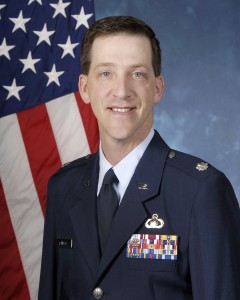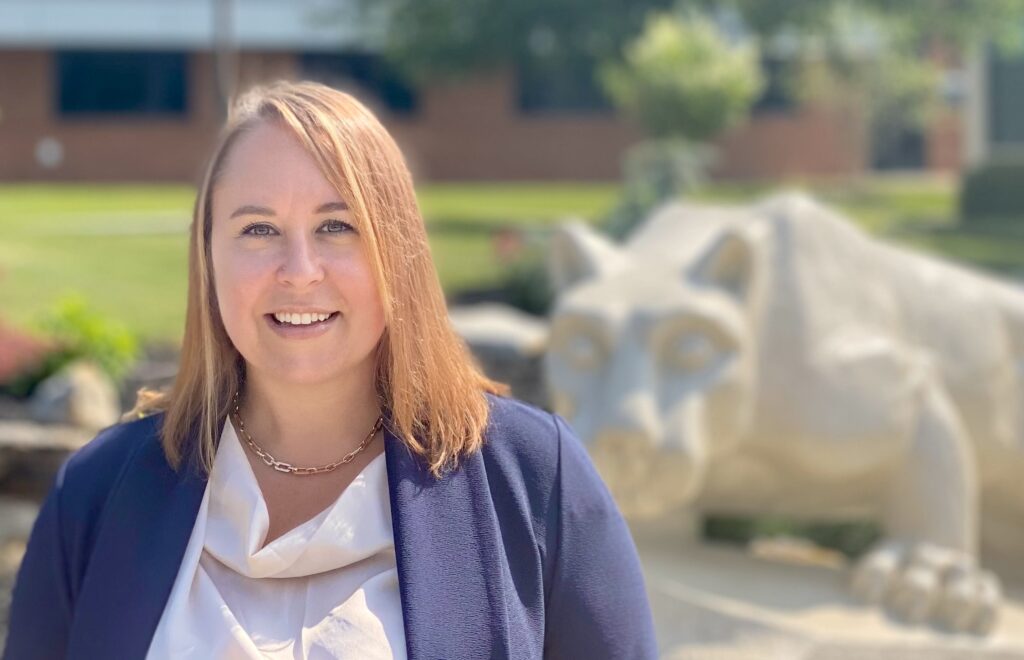Teaching Graduate Programs in Psychology and Leadership

Dr. Lindsay retired from the U.S. Air Force in 2014, after 22 years of dedicated service, to take on the directorship of the Penn State World Campus Master of Professional Studies in Psychology of Leadership at Work (MPS) program. We recently spoke with him about his background and new position with Penn State:
Please give our readers a sense of your teaching background and how you arrived at your current position at Penn State.
I arrived at Penn State last November after retiring from the United States Air Force, where I proudly served for 22+ years. The Department of Psychology wanted to start up a new MPS program, the Psychology of Leadership at Work, and they needed a director. Once I heard about the opportunity, I immediately submitted an application. I had always thought about returning to Happy Valley someday, as my family and I thoroughly enjoyed it here while I was earning my PhD in industrial/organizational (IO) psychology. The rest, as they say, is history.
While serving in the Air Force, I was privileged to spend almost 10 years on the faculty at the United States Air Force Academy (USAFA). During that time, I taught many different courses ranging from the Introduction to Psychology, to Advanced Leadership. This was at the undergraduate level; the USAFA confers only bachelor’s degrees. However, I have also taught at the graduate level at the University of Colorado at Colorado Springs and through the Penn State World Campus in the Master of Professional Studies in Human Resources and Employment Relations.
Could you tell us a bit about your background in the United States Air Force?
I entered the Air Force as a behavioral scientist after graduating from the United States Air Force Academy. During my tenure, I have served in many different capacities and at many different levels. I spent my first 8 years in the service, stationed at several different Air Force bases (AFB) in San Antonio, Texas. At Randolph AFB I started as a test psychologist, where I developed Specialty Knowledge Tests that are taken by enlisted members in order to gain promotions to higher ranks. From there I moved to Lackland AFB, where I was the deputy squadron commander for an enlisted basic training squadron. I returned to Randolph AFB where I worked at the Air Force Recruiting Services, investigating complaints and Congressional inquiries. After that stint in Texas, I relocated to the Air Force Research Laboratory at Wright Patterson AFB in Dayton, Ohio. While there I had positions as a research psychologist, military assistant to the chief scientist, and chief of the Homeland Defense Office. Subsequently, I was selected to get my master’s degree, so I returned to San Antonio, Texas, and attended the University of Texas at San Antonio and received my master’s in experimental psychology. Then, it was off to the Air Force Academy in Colorado Springs, Colorado. I served on the faculty there for 3 years, teaching a host of courses in the Department of Behavioral Sciences and Leadership. I was fortunate to be selected to get my PhD and chose Penn State to acquire my doctorate in IO psychology because of the strong reputation of both the program and the University. After a quick 2 ½ years in Happy Valley (and a successful dissertation defense), I returned to the Air Force Academy and spent 7 years on the faculty, serving in the positions of director of research, deputy department head, department head, director of the Warfighter Effectiveness Research Center, senior military faculty, then receiving tenure and promotion to full professor. I retired in November 2014.
Your teaching focuses on the psychology of leadership, which is a new degree offering for Penn State World Campus. What makes this degree desirable for students?
The neat thing about this degree is that it is applicable to all working individuals, not just those interested in organizational psychology. Since we focus on all aspects of leadership (styles, types, attitudes, motivation, diversity, creativity, groups and team ethics, etc.) and all levels of leadership (from being a follower supporting a leader, to a senior leader), it is relevant to everyone. Regardless of their chosen occupations, through this program students can learn what effective leadership is, how to develop as leaders, how to understand leadership in themselves and others, and everything in between. Specifically, the MPS in Psychology of Leadership at Work is designed for working professionals who seek advanced education in leadership to enhance their careers, support organizational goals and objectives, and apply strategies for leading, influencing, and motivating diverse work groups and individual employees. The program examines the nature and role of leadership across varied organizational settings.
If you could have lunch with one current leader, who would it be and why?
This is a very difficult question for me to answer since I love learning about leadership at all levels. My first thoughts go toward a senior leader and the experiences that he or she has had at the “top” of an organization (strategic level). However, I am also fascinated by leaders “in the thick of things” at the midlevel (operational level). Then, there are those leaders who are at the entry level, dealing with day-to-day operations (tactical leader). That said, if I had to pick one, it would be Michael Jordan. That may seem like an odd choice to some, but he has had an interesting life filled with success and failure. I am fascinated by people who have been very successful in one endeavor (as a player and businessperson) where their success hasn’t translated into another area (as an owner or baseball player) and how they react to that. They are used to being leaders/winners and then all of a sudden, they aren’t (or aren’t perceived as being a winner). How do they cope with that? How do they overcome that? What is their thought process? What do they do to develop? While there are certainly many who fall into this category, I grew up a basketball fan, so that example resonates with me.
What is the number one challenge for leaders today?
If you would allow me, I would like to mention two. The first has to do with the context of work. Leaders are facing some very challenging times in the workplace. No longer are organizations stand-alone entities that can make it on their own. They are complex, networked, diverse, global, fast-paced, information-overloaded entities. The challenge for the leader is to be able to understand and navigate this landscape while, at the same time, taking care of the people whom they lead. Leaders are often put at the crossroads of effectiveness/efficiency (performance) and take care of their people. This requires the leader to be agile, adaptive, effective, compassionate, ethical, etc. That is a tall order for a leader.
The second challenge is for leaders to understand the constant need to learn and develop. While many have risen to their position in the organization due to technical competence, when they move into a leadership role, the requirements for that leader often change. Good leaders recognize that the skills that got them there aren’t always enough, and that future development is often needed. So the challenge is to keep learning or to become a lifelong learner. A truly great leader has never arrived; they are constantly in the mode of developing.
You’re a Penn State alum and now teaching courses for Penn State. What made you come back to campus?
When my family and I were here from 2005 to 2007, we were all impressed with Penn State. I saw a world-class organization that made intentional strategic decisions to do things right. Not quick or cheap, but the right way. That really struck a chord with me. I was also impressed with the people (especially in the Department of Psychology) and their genuine desire to help and help me. That also struck a chord. There is also the reputation that Penn State has around the world in being a leader in academics and research. Needless to say, when I left Penn State with my PhD, I was both impressed and proud. When I heard about the opportunity to develop and implement the MPS in Psychology of Leadership at Work program, it was a no-brainer.
What have you learned from teaching Penn State World Campus students?
The main thing that I have learned is what an amazing group of students we have. Every semester, I have been blown away by the stories, experiences, commitment, and hard work of the students in my courses. They are engaged, bright, diverse, etc. I truly enjoy getting to know them through the course of the semester. It makes it a pleasure to share in that educational experience with them.
What makes you smile?
This is an easy question. There are four things that make me smile faster than anything else. The first is my wife, Karina, whom I have been blessed to have been married to for 23 years. She is truly an amazing woman, and I learn from her every day. The other three are my incredible children. They are a huge blessing in my life.
As an educator, it is at that moment in a course/class where I can see that the student fully gets it. You can see that he or she truly understands what this is all about. It is at that moment that a student transfers from being merely a consumer of the information in a course, to a true partner (the student accepts ownership) in his or her education/development journey. As all educators know, it is a pretty special moment.
Learn more about the Penn State World Campus Master of Professional Studies in Psychology of Leadership at Work (MPS) degree and the faculty members who teach courses within the program.

